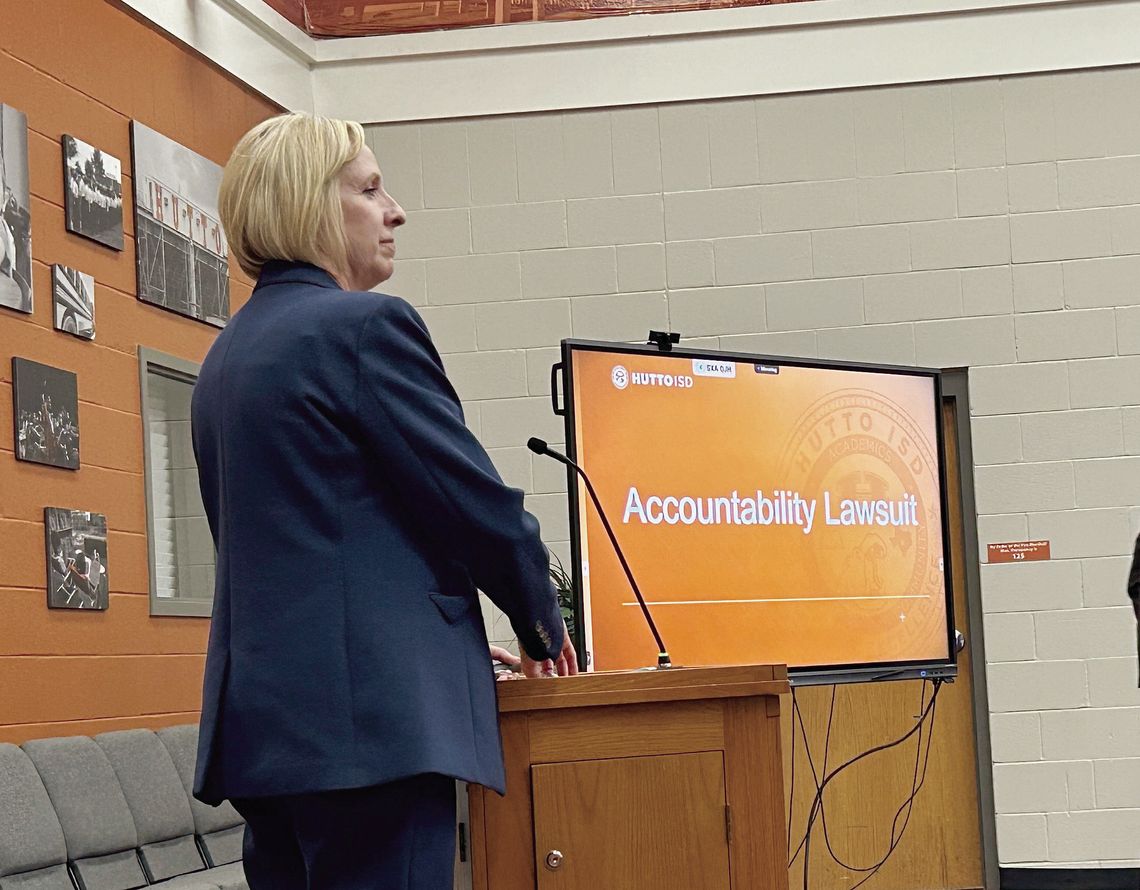Methodology in grading schools is flawed, they argue; supporters counter ratings are helpful
Local school districts are mulling whether to join a mounting legal effort challenging the Texas Education Agency’s paused – for now – accountability rating system, but many educators aren’t hesitating to give the state an “F.”
Already a second lawsuit filed by numerous districts against TEA concerning its grading system will go to trial in February.
The suit comes after the agency redesigned the State of Texas Assessments of Academic Readiness to administer it online and fully score it using an automated system last year, including the writing portion, which humans previously graded.
More than 30 school districts have joined over concerns about the validity of the test since the A-F accountability ratings are largely based on the test’s scores. They say the artificial intelligence grading was the cause of low scores, not the actual performance of students or teachers.
In addition to standardized test scores, the system rates schools’ performances based on other metrics such as enrollment growth, graduation rates and whether students are adequately prepared for careers after leaving school.
“(The TEA’s) intended goal is to communicate to the public how well a school system measures on academic performance using consistent and reliable data,” Hutto Independent School District Superintendent Jeni Neatherlin wrote in a statement emailed to the East Wilco Insider. “The fairness of the current system is certainly in question, as is the validity of some of that data.”
Supporters of the TEA effort say the letter grades, much like a student’s report card, give parents and other patrons of a school district a direct and understandable summation of how campuses are doing.
The TEA did not respond to a request for comment.
Similarly to why its AI scoring tool is creating dissatisfaction among educators, the STAAR test, overall, is not popular among their ranks. Critics say teachers and students spend more time focusing on how to pass the test rather than the content of lessons.
“The STAAR testing really limits what (teachers are) able to do in the classroom. I think both for students, (too). I think it creates a lot of anxiety,” said Raquel Saenz Ortiz, a Democrat who ran for the State Board of Education District 10 seat.
Critics also say the test can have negative impacts on lower-income schools that have fewer resources and students who may be struggling with English as a second language — as a result, these students have low STAAR test scores, branding the schools with low accountability scores.
“Most of the D’s and F’s are placed on schools that are in the poorest part of town,” said Clay Robison, the Texas State Teachers Association public affairs specialist. “It puts the stigma on those poor kids in those districts … when they don’t need a stigma, they need more education funding.”
The association is the Texas affiliate of the National Education Association, which advocates for the rights of teachers and students, essentially serving as a teacher’s union.
Hutto ISD may soon unite with the other districts, as its board of trustees considered joining the new lawsuit at an Oct. 10 workshop.
The school district is one of 120 that sued the agency previously in August 2023 to protest changes to the school accountability system.
Stricter college and career readiness benchmarks announced in January 2023 sparked the legal action. Despite announcing the changes before the 202223 school year was complete, the TEA planned to issue ratings in September 2023.
That action was halted by court order pending a legal outcome.
The school districts have argued in the filing that the agency did not give enough notice before introducing the stricter standards to allow them to adjust, which would result in inaccurate ratings.
“The (2023) lawsuit was primarily concerned with procedure,” Hutto Chief of Schools Cara Malone told trustees as she presented information for them to consider at the workshop.
Regarding the STAAR test’s automated scoring tool, trustee Shara Turner shared some insight with her fellow board members based on her experience developing AI scoring tools.
She said the tool used is logic-based and is compared and matched to scores from teachers.
“I would just make sure that people do their due diligence to understand how accurate (the scoring tool) is,” Turner said.
At press time, trustees had not decided whether to withdraw from the initial 2023 lawsuit and join the second legal action.
“(Hutto ISD) would appreciate an accountability system to be one that sees growth and support as opportunities rather than penalties. The current one is lacking in that area,” Neatherlin wrote in her statement.
When Hutto ISD joined the 2023 lawsuit, its Taylor counterpart stood behind them in moral support. The Taylor Independent School District wasn’t among the 120 districts suing, but trustees adopted a resolution for the state to practice a “fair and transparent accountability system” in February this year, the Taylor Press reported.
“Moving forward, Taylor ISD would like to see a revision in the A-F rating system that includes more transparent communication of changes, adequate advance notice for districts, and more reliable testing measures,” the school district wrote in a statement sent to the East Wilco Insider. “Ultimately, the wellbeing of our students and community is what drives our work, and we hope the state adopts a more equitable system to reflect that.”
Taylor ISD has yet to voice any consideration of joining or backing the second lawsuit.
The accountability grades are also important to parents and, in turn, affect the schools, educators said.
Critics of the TEA system said low scores could cause parents to move elsewhere, affecting property values and student enrollment, resulting in a loss of funding and resources for districts because those are determined by daily attendance.
“(Scores are) important to districts because, you know, they don’t want to get D’s and F’s on their campuses because, you know, part of their funding can be affected by it,” Robison said.
In addition, schools risk being placed under state control if a district receives consecutive failing scores, such as what occurred in the Houston Independent School District.
Now, due to the lawsuits, parents will be missing two years of ratings to reference as Travis County state district judges sided with the school districts and have placed temporary blocks on releasing the scores on Sept. 18 and August 2023.
Some say the accountability system helps push the school voucher system, which allows parents to send their children to private schools and use public tax dollars to subsidize tuition. During the last legislative gathering, Gov. Greg Abbott called several special sessions in hopes of getting the measure passed, but the effort failed.
Due to that, public schools lost a $7.6 billion boost that Abbott had made conditional on the approval of vouchers, The Texas Tribune reported.
Abbott based last year’s reelection campaign primarily on vouchers, making it a top priority and using any means necessary to pass the legislation, such as highlighting teacher raises and publicschool funding increases as bargaining chips, as previously mentioned, and even targeting members of the GOP, his own party, who don’t see eye-to-eye on the issue, The Tribune and ProPublica reported.
Voucher critics say the systems take even more money away from public schools already struggling with funds.
“When Gov. Abbott tried to pass a voucher bill (in 2023’s legislative session), … Texas had a lot of extra money. They had a $33 (billion) budget surplus,” Robison said. “They didn’t spend any of that money to increase funding for public schools because the governor was angry because they wouldn’t pass the bill.”
In July, the University of Houston and Texas Southern University released survey results that revealed while most Texas adults are against vouchers, they would still support its legislation to allow school choice for parents who can’t afford it.
“There are parents that have come to me crying, saying, one kid is doing great in public school, but the other kid is not, and they can’t afford another choice,” state House District 52 Rep. Caroline Harris Davila, a Republican, said during a panel at the Oct. 11 Williamson County Retired Teachers Association meeting.
Texas lawmakers will revisit voucher legislation in the 89th session scheduled to begin Jan. 14.








Comment
Comments